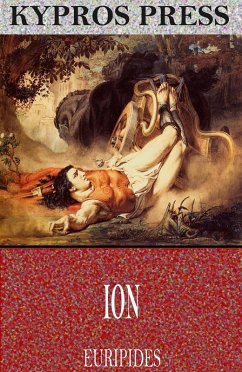
Four Plays of Aeschylus (eBook, ePUB)
Enriched edition. Eternal Themes and Tragic Heroes: Exploring Ancient Greek Drama
Kommentar: Marchmont, Lydia / Redaktion: Good Press / Übersetzer: Morshead, E. D. A.

PAYBACK Punkte
0 °P sammeln!
In "Four Plays of Aeschylus," the ancient Greek playwright presents a compelling collection that showcases the nascent art of tragedy and the exploration of profound moral themes. Aeschylus, often hailed as the father of tragedy, combines lyrical verse with dramatic dialogue, creating a rich tapestry of human experience. This anthology includes seminal works such as "Agamemnon," "The Libation Bearers," "The Eumenides," and "Prometheus Bound," each intricately woven with motifs of justice, divine retribution, and the fragility of human agency, set against the backdrop of mythological and histor...
In "Four Plays of Aeschylus," the ancient Greek playwright presents a compelling collection that showcases the nascent art of tragedy and the exploration of profound moral themes. Aeschylus, often hailed as the father of tragedy, combines lyrical verse with dramatic dialogue, creating a rich tapestry of human experience. This anthology includes seminal works such as "Agamemnon," "The Libation Bearers," "The Eumenides," and "Prometheus Bound," each intricately woven with motifs of justice, divine retribution, and the fragility of human agency, set against the backdrop of mythological and historical events. The stark intensity of Aeschylus's style, characterized by its grandeur and depth, reflects the sociopolitical context of 5th-century BCE Athens, a time marked by burgeoning democracy and existential inquiry. Aeschylus was not only a pioneer of Greek tragedy but also an Athenian who witnessed the tumultuous events of his era, including the Persian Wars. His military service and deep engagement in civic matters shaped his understanding of fate and justice, core themes that resonate profoundly in his plays. Aeschylus's innovative use of dramatic structure and his incorporation of the supernatural underscore his desire to explore the human condition within a framework that seeks answers to life's greatest dilemmas. For readers seeking to immerse themselves in the foundations of Western literature, "Four Plays of Aeschylus" is an essential addition to any literary canon. It invites contemplation of timeless moral questions and immerses the audience in the tragic beauty of its characters' struggles, making it a compelling reflection on humanity's pursuit of truth, justice, and redemption. In this enriched edition, we have carefully created added value for your reading experience: - A comprehensive Introduction outlines these selected works' unifying features, themes, or stylistic evolutions. - The Author Biography highlights personal milestones and literary influences that shape the entire body of writing. - A Historical Context section situates the works in their broader era-social currents, cultural trends, and key events that underpin their creation. - A concise Synopsis (Selection) offers an accessible overview of the included texts, helping readers navigate plotlines and main ideas without revealing critical twists. - A unified Analysis examines recurring motifs and stylistic hallmarks across the collection, tying the stories together while spotlighting the different work's strengths. - Reflection questions inspire deeper contemplation of the author's overarching message, inviting readers to draw connections among different texts and relate them to modern contexts. - Lastly, our hand-picked Memorable Quotes distill pivotal lines and turning points, serving as touchstones for the collection's central themes.
Dieser Download kann aus rechtlichen Gründen nur mit Rechnungsadresse in A, B, BG, CY, CZ, D, DK, EW, E, FIN, F, GR, H, IRL, I, LT, L, LR, M, NL, PL, P, R, S, SLO, SK ausgeliefert werden.













